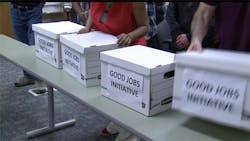Sept. 07--SeaTac voters will get to decide whether the city should increase its minimum wage to a nation-leading $15 per hour, after the state appeals court on Friday reversed a judge's ruling that voided signatures needed to qualify the measure for November's ballot.
Friday's order, issued by a three-judge panel of the Washington Court of Appeals, did not elaborate as to why King County Superior Court Judge Andrea Darvas erred in her Aug. 26 ruling. The panel wrote that a more detailed opinion explaining its order "will follow in due course."
The appeals-court panel reversed the trial court's ruling, vacating Darvas' order and a writ that otherwise would have prevented the ballot measure from going to voters this election.
"They didn't say why her ruling was wrong, just that it is wrong," said Dmitri Iglitzin, the lawyer representing the SeaTac Committee for Good Jobs, a citizens' group supporting the measure.
Regardless, Iglitzin added, "Without a writ, the measure is going to the ballot."
Darvas' order had tossed out 61 signatures of registered SeaTac voters who signed more than one petition seeking to qualify the ballot measure. That left the initiative 18 signatures shy of certification requirements.
Harry Korrell, a Seattle lawyer representing Alaska Airlines and other opponents of the measure, could not be reached for comment Friday.
In an emailed statement, a spokeswoman for Alaska Airlines said the company is still considering its legal options.
"We continue to share the concerns of residents and businesses in SeaTac that creating the nation's highest minimum wage of $15 an hour with a 63 percent pay raise would hurt them as well as the entry-level workers the initiative is intended to help," spokeswoman Bobbie Egan added.
Even if opponents appeal the order, they cannot prevent Proposition 1 -- the so-called "Good Jobs Initiative" -- from going to SeaTac voters come November.
The proposed initiative seeks to change the minimum wage for restaurant and transportation workers in SeaTac from $9.19 to $15 an hour.
Supporters of the initiative have said it will help create a "livable wage" for shuttle drivers, food-service workers and other working-class employees who typically serve customers of Seattle-Tacoma International Airport but aren't able to make ends meet for their families.
An opposition group that includes several businesses and calls itself Common Sense SeaTac has formed to challenge the measure. The group, which has raised at least $250,000 to defeat the measure, counters that it will kill small businesses, such as restaurants, that won't be able to afford to pay employees the higher rate.
King County Elections already had validated the measure, after the elections board found that of the 2,506 signatures turned in, 1,780 were valid. But, after opponents of the measure asked the SeaTac City Council to appoint a city panel to review the signatures, that group removed 201 signatures because there were no dates beside the names on the petitions.
The city's review panel, which consisted of SeaTac's mayor, police chief and city manager, still left enough signatures for the measure to qualify for the ballot. Then, a group that included Washington Restaurant Association, Alaska Airlines and Filo Foods filed a lawsuit in King County Superior Court challenging more signatures.
In all, Darvas rejected 61 additional signatures. Where the petitions had duplicate signatures, she ordered that both the original and the duplicate be eliminated. That left 1,518 signatures -- 18 fewer than the 1,536 required to get on the ballot.
The measure's supporters argued Darvas should have tossed out only the duplicate signatures -- not the originals, as well.
"It's a fundamental error to have 1,780 people sign a petition and not let it go to the ballot," Iglitzin told the panel Friday.
The appeals panel included Judges Stephen Dwyer, J. Robert Leach and Michael Spearman.
During Friday's hearing, Dwyer pointedly noted the U.S. Supreme Court has found signing a political petition to be constitutionally protected under free-speech guarantees.
Dwyer also bluntly asked Wayne Tanaka, a lawyer representing the city of SeaTac: "What is up with that goofy ordinance?"
The judge said he was referring to the city's code that "gives power to the police chief, the mayor and the city manager to overturn the ability of the county auditor, which is what happened here."
The order of the appeals court rendered moot another ruling issued in King County Superior Court later Friday that declined to place the petition on the ballot. Judge Kimberley Prochnau denied the separate petition challenging Darvas' ruling brought by two citizens whose signatures were among those she invalidated. The state appeals-court order trumps the lower court's ruling, however.
Lewis Kamb: [email protected] or 206-464-2932. Twitter: @lewiskamb
Copyright 2013 - The Seattle Times

